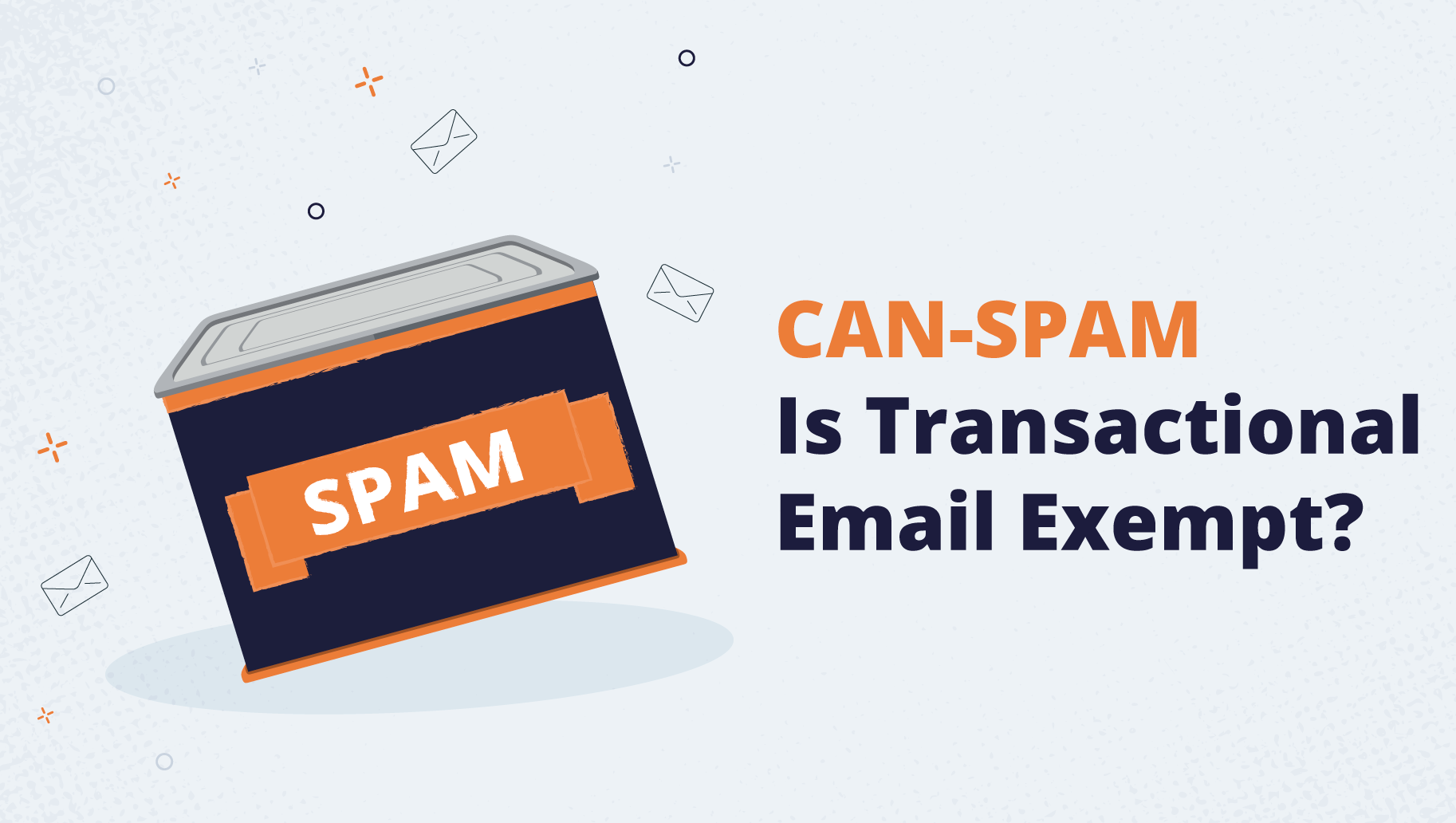CAN-SPAM stands for Controlling the Assault of Non-Solicited Pornography And Marketing. It is a law that sets rules for commercial emails.
In the world of email marketing, understanding CAN-SPAM is crucial. This law helps protect consumers from unwanted emails. It ensures that marketers follow certain guidelines when sending emails. Violating CAN-SPAM can lead to hefty fines. Knowing its rules can save your business from legal trouble.
In this blog post, we will explore what CAN-SPAM is and why it matters. You’ll learn about its key requirements and how to comply. Whether you are new to email marketing or an experienced marketer, this information is vital. Stay with us to ensure your email practices are both effective and lawful.
Introduction To Can-spam
The CAN-SPAM Act sets rules for commercial email. It gives recipients the right to stop unwanted emails. Businesses must follow these guidelines to avoid penalties.
The CAN-SPAM Act sets rules for commercial emails. It establishes requirements for commercial messages. The law gives recipients the right to stop emails. It details penalties for violations. Knowing CAN-SPAM helps marketers stay compliant.Purpose And Importance
The CAN-SPAM Act aims to reduce spam. Spam is unwanted commercial emails. This law protects consumers from misleading content. It ensures transparency in email marketing. Marketers must follow CAN-SPAM to avoid fines. Following the rules builds trust with recipients.Legislative Background
Congress passed the CAN-SPAM Act in 2003. It stands for Controlling the Assault of Non-Solicited Pornography And Marketing. The Federal Trade Commission (FTC) enforces the law. The law applies to all commercial emails. It sets guidelines on content and opt-out mechanisms. Marketers must include a clear way to unsubscribe. They must honor opt-out requests promptly. “`Key Requirements
The CAN-SPAM Act sets rules for commercial emails. Understanding its key requirements helps you stay compliant. This section breaks down the most crucial aspects you need to know.
Sender Identification
You must clearly identify yourself in the email. This means using a valid “From” name and an accurate email address. Your business name must be easy to recognize. This helps recipients know who sent the email.
Opt-out Mechanisms
Every email must have a clear way to opt out. Include a simple unsubscribe link in each email. The opt-out process should be easy and quick. You must honor opt-out requests within ten business days. This ensures recipients can easily stop receiving your emails.
Compliance Best Practices
Understanding compliance best practices is crucial in email marketing. The CAN-SPAM Act sets rules for commercial emails, establishing requirements for messages and giving recipients the right to stop receiving emails. Non-compliance can result in hefty penalties. Below are some key practices to ensure compliance and avoid legal pitfalls.
Clear Subject Lines
Your subject lines must be clear and not misleading. This is a basic requirement under the CAN-SPAM Act. Misleading subject lines can result in your emails being marked as spam, damaging your sender reputation.
- Be honest: Your subject line should accurately reflect the content of your email.
- Avoid clickbait: Do not use deceptive tactics to lure readers into opening your emails.
- Keep it simple: Use straightforward language that is easy to understand.
Valid Physical Address
Including a valid physical address in your emails is a legal requirement. This ensures transparency and builds trust with your audience.
| Requirement | Details |
|---|---|
| Physical address | Use your company’s current mailing address. |
| P.O. Box | A P.O. Box registered with the U.S. Postal Service is acceptable. |
| Commercial mail receiving agency | Addresses from commercial mail receiving agencies are also valid. |
Having a valid address reassures recipients that your business is legitimate. It also provides a way for them to contact you if needed.
By adhering to these compliance best practices, you ensure your email marketing efforts are both effective and lawful.
Penalties For Violations
Violating CAN-SPAM rules in email marketing can lead to severe penalties. Fines can reach up to $43,792 per email. Ensuring compliance is crucial to avoid these costly consequences.
Understanding the penalties for violating the CAN-SPAM Act is crucial. Non-compliance can result in severe consequences. Let’s break down the legal and financial impacts.Legal Consequences
Violating the CAN-SPAM Act can lead to legal actions. The Federal Trade Commission (FTC) enforces these rules. Each separate email in violation is subject to penalties. This means that sending multiple non-compliant emails can multiply the consequences.Financial Impact
Penalties for CAN-SPAM violations can be hefty. Each email can cost you up to $46,517 in fines. This amount can add up quickly. Sending multiple emails can lead to significant financial loss. Businesses must also consider legal fees. Defending against a CAN-SPAM lawsuit can be costly. These expenses add to the overall financial burden. Staying compliant helps avoid these financial pitfalls. “`Role Of Email Service Providers
Email Service Providers (ESPs) play a crucial role in ensuring that email marketing campaigns comply with the CAN-SPAM Act. They offer tools and guidance to help marketers follow the law. ESPs are responsible for monitoring and reporting any violations. This helps maintain a clean and trustworthy email ecosystem.
Ensuring Compliance
ESPs provide features to ensure compliance with the CAN-SPAM Act. These features include:
- Opt-in forms: These forms ensure recipients consent to receive emails.
- Unsubscribe links: All emails must include an easy-to-find unsubscribe link.
- Sender information: Accurate sender information must be included in each email.
These tools help marketers adhere to legal requirements. They also protect the reputation of the sender.
Monitoring And Reporting
ESPs have systems in place to monitor email campaigns. They track open rates, click-through rates, and bounce rates. This data helps identify potential issues. ESPs also offer reporting tools to help marketers understand their performance.
Additionally, ESPs may flag suspicious activity. This includes high complaint rates or spam reports. These flags help prevent future issues and maintain compliance with CAN-SPAM regulations.

Credit: pipeline.zoominfo.com
Consumer Protections
Can Spam in email marketing sets rules for commercial emails. It protects consumers from unwanted messages. Businesses must follow these rules to avoid penalties.
Understanding consumer protections under the CAN-SPAM Act is vital. This law safeguards email recipients from unwanted messages. It ensures that marketers follow specific rules.Rights Of Recipients
Recipients have the right to opt-out of emails. Marketers must honor this request quickly. The opt-out process should be easy to find and use. Email senders cannot charge a fee or make the recipient take more steps. They must stop sending emails within ten business days.Reporting Non-compliance
Consumers can report non-compliance to the Federal Trade Commission (FTC). The FTC takes action against violators. People can file a complaint online. They provide information about the sender and the email. This helps the FTC track and penalize offenders. Reporting helps keep inboxes free from spam. It also ensures that marketers follow the law. “`Updates In 2025
In 2025, there have been significant changes to the CAN-SPAM Act. These updates aim to better protect consumers and ensure fair practices in email marketing. As technology evolves, so do the laws governing it. This year, new amendments and trends have emerged, shaping the future of email marketing.
Recent Amendments
The recent amendments in 2025 focus on stricter regulations and enhanced transparency. Key changes include:
- Stronger Consent Requirements: Marketers must now obtain clear, explicit consent before sending emails.
- Opt-Out Process: The opt-out process has been simplified. Users must be able to unsubscribe with one click.
- Sender Identification: Email senders must provide accurate contact information, including a physical address.
- Content Restrictions: Misleading subject lines and deceptive content are strictly prohibited.
Future Trends
Looking ahead, several trends are expected to shape email marketing under the CAN-SPAM Act:
- Advanced Spam Filters: Email providers are developing more sophisticated spam filters to detect and block unsolicited emails.
- AI Integration: Artificial intelligence will help marketers create personalized, compliant email campaigns.
- Increased Penalties: Penalties for non-compliance will become more severe to deter unethical practices.
- Global Alignment: Efforts to align CAN-SPAM with international email regulations will increase, ensuring global standards.
These updates and trends ensure a better experience for email recipients and fairer practices for marketers. Staying informed about these changes is crucial for anyone involved in email marketing.

Credit: www.socketlabs.com

Credit: www.americaneagle.com
Frequently Asked Questions
What Is The Can-spam Act?
The CAN-SPAM Act is a law that sets rules for commercial emails. It establishes requirements for commercial messages, gives recipients the right to stop emails, and outlines penalties for violations.
Why Is Can-spam Compliance Important?
CAN-SPAM compliance is important to avoid legal penalties and maintain your sender reputation. It ensures your emails are not marked as spam and respects recipients’ preferences.
What Emails Are Covered Under Can-spam?
The CAN-SPAM Act covers all commercial emails, which are emails promoting a product or service. It does not apply to transactional or relationship messages.
How Do You Comply With Can-spam?
To comply with CAN-SPAM, include a clear opt-out method, avoid misleading headers, and provide your physical address. Ensure the subject line accurately reflects the email content.
Conclusion
Understanding CAN-SPAM is vital for email marketing. It ensures compliance and trust. Following the rules keeps your emails legal. Your audience will appreciate the respect for their privacy. Always offer an easy opt-out option. This builds a positive relationship with your subscribers.
Simple steps can keep you on the right side of the law. Keep your marketing efforts ethical and effective. Stay informed, stay compliant. Your business will benefit in the long run.



Leave a Reply